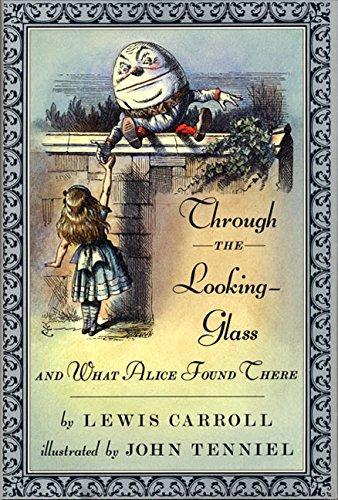228 pages
English language
Published Aug. 2, 1993

228 pages
English language
Published Aug. 2, 1993
Through the Looking-Glass, and What Alice Found There (also known as Alice Through the Looking-Glass or simply Through the Looking-Glass) is a novel published on 27 December 1871 (though indicated as 1872) by Lewis Carroll, a mathematics professor at the University of Oxford, and the sequel to Alice's Adventures in Wonderland (1865). Alice again enters a fantastical world, this time by climbing through a mirror into the world that she can see beyond it. There she finds that, just like a reflection, everything is reversed, including logic (for example, running helps one remain stationary, walking away from something brings one towards it, chessmen are alive, nursery rhyme characters exist, and so on). Through the Looking-Glass includes such verses as "Jabberwocky" and "The Walrus and the Carpenter", and the episode involving Tweedledum and Tweedledee. The mirror above the fireplace that is displayed at Hetton Lawn in Charlton Kings, Gloucestershire (a house …
Through the Looking-Glass, and What Alice Found There (also known as Alice Through the Looking-Glass or simply Through the Looking-Glass) is a novel published on 27 December 1871 (though indicated as 1872) by Lewis Carroll, a mathematics professor at the University of Oxford, and the sequel to Alice's Adventures in Wonderland (1865). Alice again enters a fantastical world, this time by climbing through a mirror into the world that she can see beyond it. There she finds that, just like a reflection, everything is reversed, including logic (for example, running helps one remain stationary, walking away from something brings one towards it, chessmen are alive, nursery rhyme characters exist, and so on). Through the Looking-Glass includes such verses as "Jabberwocky" and "The Walrus and the Carpenter", and the episode involving Tweedledum and Tweedledee. The mirror above the fireplace that is displayed at Hetton Lawn in Charlton Kings, Gloucestershire (a house that was owned by Alice Liddell's grandparents, and was regularly visited by Alice and Lewis Carroll) resembles the one drawn by John Tenniel and is cited as a possible inspiration for Carroll. It prompted a newfound appreciation for its predecessor when it was published.